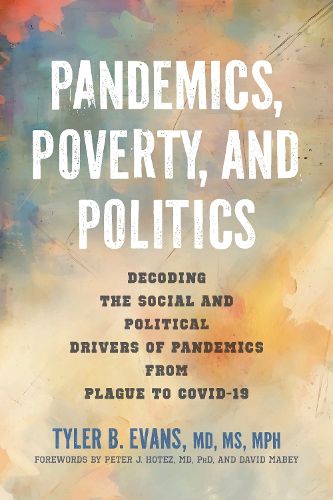Readings Newsletter
Become a Readings Member to make your shopping experience even easier.
Sign in or sign up for free!
You’re not far away from qualifying for FREE standard shipping within Australia
You’ve qualified for FREE standard shipping within Australia
The cart is loading…






A compelling exploration of how socio-political factors like inequality and poverty exacerbate pandemics.
In a world where millions perish from preventable diseases amid unprecedented wealth and technological advancement, Pandemics, Poverty, and Politics illuminates a central paradox of our times. This compelling work by a seasoned physician and global health leader unravels the complex web of social, political, and economic factors driving pandemics and other public health crises.
Drawing from over two decades of experience in the public health field, Tyler B. Evans, MD, MS, MPH, presents a unique and deeply personal narrative. The book begins with a foundational introduction to social medicine and health systems, as well as the social and political determinants of health. Dr. Evans provides readers with examples of every major pandemic starting with the turn of the twentieth century to current times-beginning with the third plague and ending with COVID-19-highlighting the common social and political drivers of these outbreaks. Fractured health systems worsened by social disruption place inordinate stress on societies and disproportionately impact the most vulnerable. These historic examples of pandemics in addition to more contemporary examples of ongoing epidemics and major public health concerns ranging from malaria and neglected tropical diseases to influenza, HIV/AIDS, diarrheal diseases, Ebola, and tuberculosis reinforce how sociopolitical factors build upon each other. Case in point: high population stress following political repression and unrest in apartheid South Africa contributed to a major outbreak of HIV in the 1990s, as did multinational diamond mining and minimal infrastructure help precipitate the worst ebola outbreak in history in Sierra Leone.
While scientific advancements have progressed, the failure to address underlying social inequities leaves us vulnerable to even more devastating health crises. This book is an essential read for public health and health care professionals, policymakers, social science researchers, students, and anyone committed to understanding and mitigating the complex factors that underpin global health emergencies.
$9.00 standard shipping within Australia
FREE standard shipping within Australia for orders over $100.00
Express & International shipping calculated at checkout
A compelling exploration of how socio-political factors like inequality and poverty exacerbate pandemics.
In a world where millions perish from preventable diseases amid unprecedented wealth and technological advancement, Pandemics, Poverty, and Politics illuminates a central paradox of our times. This compelling work by a seasoned physician and global health leader unravels the complex web of social, political, and economic factors driving pandemics and other public health crises.
Drawing from over two decades of experience in the public health field, Tyler B. Evans, MD, MS, MPH, presents a unique and deeply personal narrative. The book begins with a foundational introduction to social medicine and health systems, as well as the social and political determinants of health. Dr. Evans provides readers with examples of every major pandemic starting with the turn of the twentieth century to current times-beginning with the third plague and ending with COVID-19-highlighting the common social and political drivers of these outbreaks. Fractured health systems worsened by social disruption place inordinate stress on societies and disproportionately impact the most vulnerable. These historic examples of pandemics in addition to more contemporary examples of ongoing epidemics and major public health concerns ranging from malaria and neglected tropical diseases to influenza, HIV/AIDS, diarrheal diseases, Ebola, and tuberculosis reinforce how sociopolitical factors build upon each other. Case in point: high population stress following political repression and unrest in apartheid South Africa contributed to a major outbreak of HIV in the 1990s, as did multinational diamond mining and minimal infrastructure help precipitate the worst ebola outbreak in history in Sierra Leone.
While scientific advancements have progressed, the failure to address underlying social inequities leaves us vulnerable to even more devastating health crises. This book is an essential read for public health and health care professionals, policymakers, social science researchers, students, and anyone committed to understanding and mitigating the complex factors that underpin global health emergencies.